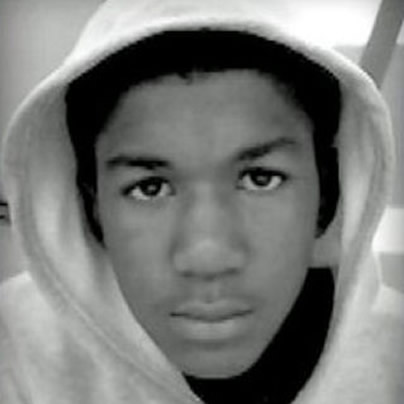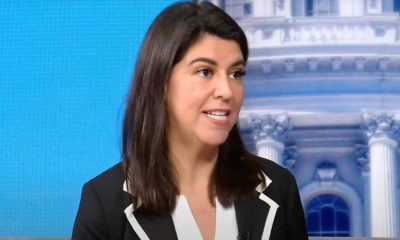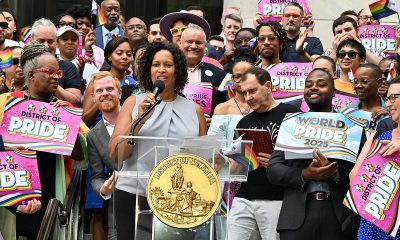Opinions
Racial discrimination still looms large
Trayvon verdict, voting rights ruling remind us of need for dialogue


George Zimmerman’s acquittal in the killing of Trayvon Martin has helped trigger a much-needed dialogue on race. (Photo released into the public domain by the family of Trayvon Martin)
Issues of racial discrimination and injustice are looming larger than they have in quite a while after a summer that has produced a “not guilty” verdict for George Zimmerman in the killing of unarmed Florida teenager Trayvon Martin; the dismantling of the pre-clearance provision of the Voting Rights Act, which required jurisdictions with a history of discrimination to pre-clear voting changes with the federal government; the ushering in of a higher standard of scrutiny when viewing college Affirmative Action policies; and racial slurs by culinary icon Paula Deen.
In May of this year, shortly after the D.C. At-Large Council race, I penned an article for the Blade titled, “D.C. election shows need for dialogue on race.” While many people were open to the substance of the article, several others became quite defensive and wanted to ignore the subject. Major publications in the area gave significant print space or airtime to those who were appalled that a Council candidate discussed the role of race in the election, after being posed a direct question on the subject. It didn’t matter that the candidate’s answer was an attempt to acknowledge “the concerns of some residents who fear that their needs may not be adequately addressed if they don’t have somewhat proportionate representation on the Council,” as I pointed out in my earlier article.
Rather than delve into those sentiments and attempt to understand why a significant portion of the electorate feels this way, mainstream publications chose to silence those of us who expressed a need for a dialogue on race and sought to explain those sentiments by denying us a platform to express our views and tarnishing a good Councilwoman’s name.
Now, in the aftermath of the Zimmerman verdict, the role that race plays in our country is starting to be discussed by individuals of all racial backgrounds, although many people still prefer to avoid the topic. Some of the people who attacked me for expressing the need for racial dialogue are now publicly championing the cause. It should not take a national tragedy (and yes, the killing of a promising child without recourse is a national tragedy) to raise an issue that many of us see every day and have publicly expressed, only to be met by comments that the election of Barack Obama as the first African-American president proves that we are now in “post-racial” times.
Whether it’s a young black man who gets pulled over for “driving while black,” a young black woman who gets followed around a trendy store, a black man who has people lock their doors when he walks by, an upwardly mobile black professional that gets his or her resume discarded when applying for a job with an ethnic name, or a black striver with solid credit who gets steered into a subprime mortgage when similarly situated white people are given traditional mortgages, many of us face this type of discrimination on a regular basis and don’t have the luxury to believe that race is not a factor in D.C. or in America.
These incidents color the lens from which we view the world and the lack of knowledge about the type of racism that African Americans face today, as well as having never faced these types of incidents first-hand, colors the lens from which other races view the world and the role that race plays in society.
This is important because when African Americans discuss race, we bring our collective experiences to the discussion. Thus, the sentiment not to discuss the subtext of race in a political campaign seems similar to the sentiment not to directly call Zimmerman’s suspicion of Trayvon Martin “racial profiling.” Not talking about the role race plays in a situation does not make it go away. Rather, it gives it a larger role in the minds of those who were not able to express their sentiments and have true dialogue on the issue. With notable racial disparities in income, health outcomes, safe communities, and access to quality K-12 education options, I am sure it will be fascinating to watch how everyone dances around topics of race in the upcoming mayoral race.
It was heartening to see 34 LGBT organizations sign onto a statement expressing solidarity with Trayvon Martin’s family and friends in the “fight for justice, civil rights and closure.” The line that stood out to me the most was, “[o]ur community has been targets of bigotry, bias, profiling and violence. We have expressed the heart-breaking despair of young people targeted for who they are, who they are presumed to be, or who they love.” I could not agree with this sentiment more. It is important for us all to recognize that all human rights struggles are related because only when everyone recognizes this relatedness will we see unprecedented progress in our collective quest for equality.
Rev. Martin Luther King, Jr.’s statement that, “Injustice anywhere is a threat to justice everywhere” still rings true today. Thus, we should all be outraged when a teenage boy cannot safely walk from the store to his father’s home without being stalked and killed. Similarly, we should all be outraged when a gay couple cannot walk down the street together, in some places, without being viciously assaulted. We cannot be content to celebrate the victories in the two Supreme Court marriage equality cases, without expressing outrage about the setbacks in the voting rights and affirmative action cases. Our quest for true equality depends on it.
Lateefah Williams is a writer, attorney and community activist in D.C. She is the immediate past president of the Gertrude Stein Democratic Club, the District’s largest LGBT political organization. Reach her at dcprogressivepotpourri.com or [email protected] or follow her @lateefahwms.
Opinions
Vote Democratic or July 4, 2025 will look very different
Biden’s debate performance was bad but the sky is not falling

As we celebrate the founding of our country, we must recognize the election on Nov. 5 could dramatically change how our country looks in the future. We can debate whether Joe Biden is the best candidate for Democrats on the ticket, but reality is, whoever the Democratic candidate is, they must defeat Donald Trump. Trump is a racist, sexist, misogynistic, homophobic pig who was found liable for sexual assault and convicted of 34 felonies. A man who spouts lies every time he opens his mouth. A man who uses Hitler’s words, and said he will be a dictator on his first day in office. A man who said he will seek retribution on any opponent, using the Department of Justice and IRS to do his dirty work.
Yes, President Joe Biden had a disastrous debate, and many pundits are calling for him to step down as the candidate. They are having a field day doing so, because none of them are involved in the process that would follow. None of them mention the two times in recent history, Democratic presidents chose to not run for a second term, Lyndon Johnson and Harry Truman, a Republican won. This time the Republican alternative is the disgusting, evil, Donald Trump. Even the New York Times editorial board, when calling for Biden to step aside as a candidate, wrote, “If the race comes down to a choice between Mr. Trump and Mr. Biden, the sitting president would be this board’s unequivocal pick. That is how much of a danger Mr. Trump poses.”
The simple truth is Biden feels he can win, and won’t step aside. The only person who could convince him to do so, is his wife, Jill Biden, and she has shown she will not do that. She reminds me a little of Nancy Reagan, who protected her husband when he had issues with cognition.
What all Americans need to understand, is no American president makes decisions on their own, without massive consultation with advisers. They don’t meet foreign dignitaries alone, but with advisers. And President Biden has shown he has the most incredible group of advisers around him, maybe with the exception of those who prepared him for this debate.
I have loads of questions for them. If President Biden had a cold as claimed, why didn’t they tell him to begin his first statement of the debate with an apology to the audience. Something like, “I want to take a moment to apologize to the TV audience on how my voice is today, and how it will sound to you. I have a severe cold and will sound raspier, and slower, but of course feeling a little ill would not keep me from being here today.” It could have changed the tenor of the debate. It would not have excused his poor performance, but may have given people a few thoughts in his favor. Then there was the closing two minutes. How is it possible the president wasn’t coached on ending the debate with the issues he has said he believes will win for Democrats: abortion, climate change, and saving democracy? The debate prep team kept him cloistered for a week; seems they could be sued for malpractice.
Again, it was a disastrous debate for President Biden. But then rather than what the pundits are saying, grassroots Democrats are responding with money. The Biden campaign reported Saturday that it raised $27 million on Thursday and Friday. The hour after the debate ended was its best grassroots fundraising hour since Biden kicked off his reelection campaign, per the Hill.
So contrary to the all the pundits, the sky is not falling. Yes, there is a lot more work to do than before the debate. But the focus for all Democrats, and all decent people, must be to ensure we don’t reelect Trump, because of what he would do to our country. How his election would change us. How if he did what he says, and tries to return all decisions on just about everything, to the states, it is not only women who must be scared. It is Blacks, the LGBTQ+ community, every minority; and young people who will live longest with the results of doing nothing to ameliorate climate change. They should all be very scared.
So happy 4th and here’s to hoping Americans are smart enough to vote correctly, and ensure July 4, 2025 will be just as happy.
Peter Rosenstein is a longtime LGBTQ rights and Democratic Party activist. He writes regularly for the Blade.

Joe Biden was clearly ready with some facts for this debate, the sad part is he couldn’t articulate them. He sounded raspy, and lost track of what he was saying in the first few minutes of the debate. He did get better as the debate progressed but came off sounding and looking like an old man. For those of us hoping he would sound like he did at the State of the Union, or the speech he gave on anti-Semitism, it was a huge disappointment.
So, where his campaign goes from here is anyone’s guess. Behind the scenes some Democrats are calling for him to step down as the candidate. But that is much more difficult than it seems at this time. And then, will there be a fight for who the candidate will be. Will it automatically be Kamala Harris, or will it be someone else? So many unanswered questions over the next couple of weeks.
The only positive take-away for Democrats from the debate was how deranged Donald Trump sounded. He refused to deal with any issue, refused to say he would accept the results of this election, refused to acknowledge climate change, or Jan. 6, and kept saying how the states should control the issue of abortion, and women’s health. Every one of these things should be frightening to so many people. It is clear if Trump is elected, we will have a dictator in the White House, who believes Hitler did good things. His election is scary for women, young people, Black Americans, and the LGBTQ community. If states control issues related to any of these groups, they are screwed.
One of the very few good lines Biden got across was when he said 40 high-level Trump appointees, members of the Cabinet, and his vice president, have refused to endorse him as they know him best. People need to take their word for how bad he will be should he be reelected. Trump kept talking nonsense and it was hard to keep up with the lies. The moderators didn’t call him on any of it, but CNN has said before the debate they wouldn’t. But then Biden missed so many chances to call him on the garbage he was spouting. I kept hoping he would turn to him and say clearly, “You can’t believe all the BS you are spouting. You sound like a deranged six-year-old and someone who would take our country down the tubes.”
Now I accept the fact Biden speaks more slowly and softly. Though after the debate they said he had a cold. He could have said that at the beginning of the debate, if it was true, and explained his voice to the audience. And while we know he has a stutter, it seemed so much worse during the debate than it normally does. Was it nerves, maybe, but difficult nonetheless for him, and for those listening. We must have compassion for anyone with any kind of a disability. Then one had to ask, was he over-prepared for this debate? Was he so scripted he didn’t dare say anything off script. When he did, they got into this thing about golf handicaps and both sounded so childish.
Biden did manage to talk about the things he has done, and the successes of his first administration. There have been many. First bringing the country successfully out of the pandemic. He spoke about unemployment being the lowest it has been in decades, and the more than 15 million jobs created since he took office. He was honest about inflation and the fact that not all the economic successes the country is having are trickling down to every American. He understands that rents are high, and grocery bills are still too high. He made clear he wants to raise taxes on the rich and Trump wants to lower them. He had a plan to ensure Social Security would stay solvent, Trump had nothing as usual.
Finally, I was surprised that in his two-minute closing, Biden didn’t go back to the issues of abortion, climate change, and saving democracy. Did his debate prep team tell him not to? If so, they were wrong. Whether it remains Joe Biden on the ticket, or is someone else, I am 1,000% committed to do everything I can to see Democrats are elected across the board. It is clear to me, and should be to all decent people, electing Donald Trump and his MAGA Republicans, will be the end of our country as we know it today.
Peter Rosenstein is a longtime LGBTQ rights and Democratic Party activist. He writes regularly for the Blade.
Opinions
As fewer anti-LGBTQ bills pass, the fight gets harder
A growing indifference to suffering that is baked into the legal system

In recent years, advocates have faced an unprecedented avalanche of anti-LGBTQ legislation each spring. In 2024, however, the onslaught seems to have faltered somewhat. While hundreds of anti-LGBTQ bills were once again introduced, as many state legislative sessions draw to a close, fewer bills have been enacted into law.
While that may seem like cause for celebration, it’s also cause for concern.
To be sure, the slowdown in anti-LGBTQ legislation is welcome. Beginning in 2020, legislation targeting transgender rights in particular had sailed through state legislatures, with the number and scope of hostile bills increasing each year. Unlike earlier years when one or two prominent anti-LGBTQ bills triggered a national pushback that often chastened lawmakers, hundreds of bills have been introduced during legislative sessions in the last four years, often with little debate or scrutiny, and dozens of them zealously passed into law.
Those bills do real damage when they are enacted, cutting LGBTQ people off from material benefits like health care and domestic violence shelters, recognition by the state, and equal participation in public life. Even when they fail to become law, they have devastating effects on the mental health of LGBTQ people, throwing their lives into disarray and sapping valuable time and energy from LGBTQ communities. This especially affects children, with more than 90 percent of LGBTQ young people in a recent Trevor Project survey reporting that politics had negatively affected their personal well-being.
But the recent slowdown, far from being a positive signal, may well reflect a growing indifference to the suffering of LGBTQ people that is now baked into the political and legal system. Opponents of LGBTQ rights have normalized hostile rhetoric and enacted draconian laws that seemed unthinkable just a couple of years ago, and even ardent supporters of equality find themselves unsure how they might reverse state laws that unapologetically strip away LGBTQ rights.
If anything, it has become apparent that the damage that has been done since 2020 will most likely reverberate for a generation, and the past year shows that restoring and advancing LGBTQ rights will be a painstaking endeavor.
And one sobering reason for the slowing pace of anti-LGBTQ legislation is that, at this point, many conservative states have already stripped away important rights, particularly for transgender children. As of 2024, half of the states in the U.S. prohibit transgender girls from playing school sports, and half have banned or criminalized at least some forms of medically indicated healthcare.
Put differently, lawmakers aren’t targeting some rights this year because they’ve already eviscerated them.
Yet even as the pace of legislation slows, critical rights continue to be stripped away. According to the ACLU, more than 30 anti-LGBTQ bills have been enacted in 2024 — fewer than the 84 enacted in 2023, but still far too many. Among them, Utah and Mississippi restricted transgender people from accessing bathrooms and locker rooms in public schools and other government buildings.
Lawmakers in Ohio overrode the governor’s veto to ban transgender children from receiving gender-affirming care or playing sports consistent with their gender identity. South Carolina and Wyoming similarly enacted blanket bans preventing transgender children from accessing gender-affirming care.
Many of the bills that have been introduced this year sought to expand existing anti-LGBTQ legislation in new ways. Alabama, for example, successfully expanded its bathroom ban from K-12 schools to colleges and universities. Even those that didn’t pass are in many cases likely to be reintroduced after the 2024 election, particularly if anti-LGBTQ lawmakers increase their showing in state legislatures or if governors who are supportive of LGBTQ rights are no longer positioned to veto hostile legislation.
In many states with anti-LGBTQ legislation, administrative and regulatory agencies are being used to curtail LGBTQ rights even further. Florida offers an instructive example. Even after years of anti-LGBTQ legislation, the Florida Department of Highway Safety and Motor Vehicles took things a step further within its mandate, and decided in 2024 that transgender people could no longer update the gender marker on their driver’s licenses. This echoes recent regulatory crackdowns elsewhere in the United States, from the Texas Department of Family and Protective Services investigating parental support for transgender children as child abuse to school boards across the country stripping away lifesaving resources in schools.
And while many believed that courts would provide a bulwark against discriminatory legislation and regulations, in part because of strong Supreme Court precedent to suggest that anti-transgender discrimination is a form of sex discrimination, that has not consistently been the case. Trial courts have largely found in favor of transgender litigants, criticizing the insufficient justification and discriminatory purpose of anti-transgender laws, but some appellate courts have nevertheless allowed the laws to take effect.
Perhaps most alarming, there are advocates and lawmakers who, if in a position to do so, are eager to carry out an even harsher attack on LGBTQ rights. Project 2025, which a group of conservative organizations has drafted as a roadmap for a second Trump administration, promises an even more draconian attack on LGBTQ rights. This would include rolling back existing nondiscrimination protections for LGBTQ people, reinstating the transgender military ban, and codifying state restrictions on transgender rights at the federal level, in addition to limiting recognition of same-sex relationships.
The anti-LGBTQ backlash may be waning in certain respects — but in other ways, it has only just begun. As we celebrate Pride, LGBTQ people and their allies should be mindful of the need to support those communities whose rights are being eroded, invest in transgender rights organizing, demand that lawmakers prioritize LGBTQ rights, and fight for the independent institutions and protections for basic freedoms that are essential to hold power to account.
Ryan Thoreson is a specialist on LGBTQ rights at Human Rights Watch and teaches at the University of Cincinnati College of Law.
-

 Canada2 days ago
Canada2 days agoToronto Pride parade cancelled after pro-Palestinian protesters disrupt it
-

 Theater5 days ago
Theater5 days agoStephen Mark Lukas makes sublime turn in ‘Funny Girl’
-

 Baltimore4 days ago
Baltimore4 days agoDespite record crowds, Baltimore Pride’s LGBTQ critics say organizers dropped the ball
-

 Sports4 days ago
Sports4 days agoHaters troll official Olympics Instagram for celebrating gay athlete and boyfriend












